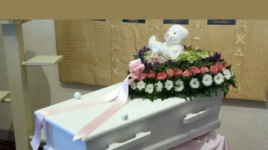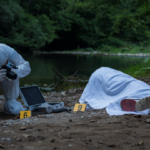Kathleen Folbigg Has Been Pardoned, But Her Criminal Convictions Remain in Place

New South Wales Attorney General Michael Daley says he is open to changes within the justice system which may prevent another situation like Kathleen Folbigg’s as he announced her pardon and release from prison earlier this week after she spent 20 years in prison, over wrongful convictions for killing her four children.
There are also calls for the case to be urgently brought before the state’s highest court, the New South Wales Court of Criminal Appeal (NSWCCA), so that the four convictions – three of murder and one of manslaughter – can be formally quashed; something which can only be done by a court of law.
Charged, convicted and sentenced
In a case that gripped and polarised the nation, Kathleen Folbigg was convicted in 2003 of murdering three of her four infants – Patrick Allen (eight months of age), Sarah Kathleen (ten months) and Laura Elizabeth (nineteen months) – who died in separate incidents between February 1989 and March 1999.
She was also convicted of manslaughter in relation to the death of her fourth child, Caleb Gibson (aged just nineteen days).
She was sentenced to a full term of 40 years in prison with a parole period of 25 years, and her multiple appeals and applications for release on parole were all unsuccessful.
Saved by science
Over the years, advances in science and medical research suggested Ms Folbigg was not in fact Australia’s ‘most notorious child killer’, but in fact a loving mother whose children died due to a genetic condition.
In 2019, a judicial inquiry rejected new research which suggested the Folbigg girls may have died in a way other than at the hands of their mother.
But research published in 2020 led ninety Australian medical and scientific professionals to petition the NSW Governor to pardon Ms Folbigg, saying that all of the deaths could be explained scientifically, and that it could not therefore be concluded that she was guilty of the crimes to the criminal standard – beyond a reasonable doubt.
Instead a public inquiry was conducted, beginning in November last year, which has now concluded, and led to her pardon.
The inquiry, headed by the former Chief Justice of the Supreme Court of New South Wales, Thomas Bathurst heard evidence that Kathleen Folbigg and her two daughters had rare genetic variation which can cause Sudden Infant Death Syndrome (SIDS), often presenting as irregular heartbeat.
It found that Ms Folbigg’s first-born son, Patrick Allen, may have died from an underlying neurogenetic disorder such as epilepsy.
Although there remains uncertainty as to how Caleb died, Mr Bathurst determined that, “the coincidence and tendency evidence which was central to the [2003] Crown case falls away”.
He concluded that “there was reasonable doubt as to the guilt of Ms Folbigg for each of the offences for which she was originally tried”.
Flaws in the original trial
He also noted that Kathleen’s diaries, which were a key piece of evidence in her original trial, were the writings of a grieving and possibly depressed mother, blaming herself for the death of each child, as distinct from admissions that she murdered or otherwise harmed them.
The prosecution relied heavily on the specific diary entries as admissions of guilt, however students of law and indeed professors of law over the years have identified from transcripts a number of issues with the way the diary entries were presented by the prosecution.
Further, the original trial centred on the fact that Kathleen Folbigg was presumed to have smothered her children despite the fact that there was no real evidence, nor marks on the babies when they died that they had been.
Bathurst also said he was “unable to accept … the proposition that Ms Folbigg was anything but a caring mother for her children”.
What is a ‘pardon’?
Kathleen Folbigg has now been released, with a pardon. What happens next is unclear – she has been in prison for 20 years, serving time for a crime she did not commit and as one of her supporters plainly said: no one can just “wave a wand” and make this all ok.
She will most likely now apply for compensation. However, it should be noted that unlike various jurisdictions within the United States of America, a person who is wrongly convicted in Australia of a crime and spends time in prison does not have a right to compensation, and there are no compensatory schemes purporting to make financial amends – even in cases where a person may spend decades behind bars.
In fact, unless the state authorises an ex gratia payment (a voluntary payment of compensation), the aggrieved person must establish that an identified legal wrong occurred at the time of charging, or prosecution, or at some time thereafter, in order to be eligible for damages.
Such wrongs include false imprisonment and malicious prosecution – which some may argue could be difficult to prove in the Folbigg case where, in the eyes of many, there was no substantial evidence of wrongdoing given the state of science at the time.
Compensation has only ever been paid to wrongfully imprisoned persons in a handful of cases, such as the highly-publicised Lindy Chamberlain case, where she was paid undisclosed sum from the Australian Government in 1992, believed to have been about $1.3 million.
Quashing the convictions
In terms of reputation and clearing Ms Folbigg’s name, there are calls (as stated) for her case to be brought before the NSWCCA in order for her convictions to be formally quashed.
Thomas Bathurst will finalise his report within the coming weeks and it is likely that he will make a recommendation that the NSWCCA consider the case.
If he doesn’t do that, Kathleen Folbigg’s own legal team may also apply to the NSWCCA for the convictions to be quashed on the basis of fresh evidence.
Need for a Criminal Case Review Committee
A significant problem faced by those who have exhausted all regular avenues court appeals is that post-appeal mechanisms for redetermining questionable convictions are virtually non-existent in Australia.
As stated by Former High Court Justice Michael Kirby in his interview with Sydney Criminal Lawyers in February 2022, Australia does not have a body to review cases after all appeals have been exhausted.
This is unlike other Western democracies such as the United States and the United Kingdom which have solid mechanisms for conducting such reviews, one of which is the Criminal Case Review Committee in the UK.
The United States also has several established and reasonably funded and resourced Innocence Projects in place to investigate potential cases of wrongful conviction, gather evidence and use court applications to have those cases heard. And while Innocence Projects do exist in Australia, they are nowhere near as extensive, well funded or resourced, and the legal hurdles they face are far higher than those in the US.
Former Justice Kirby explains that, unless the situation in Australia changes, many people who have been wrongfully convicted and are spending time behind bars will continue to do so – they will not be as ‘fortunate’ as Ms Folbigg, who had an entire campaign with many vocal supporters behind her.







